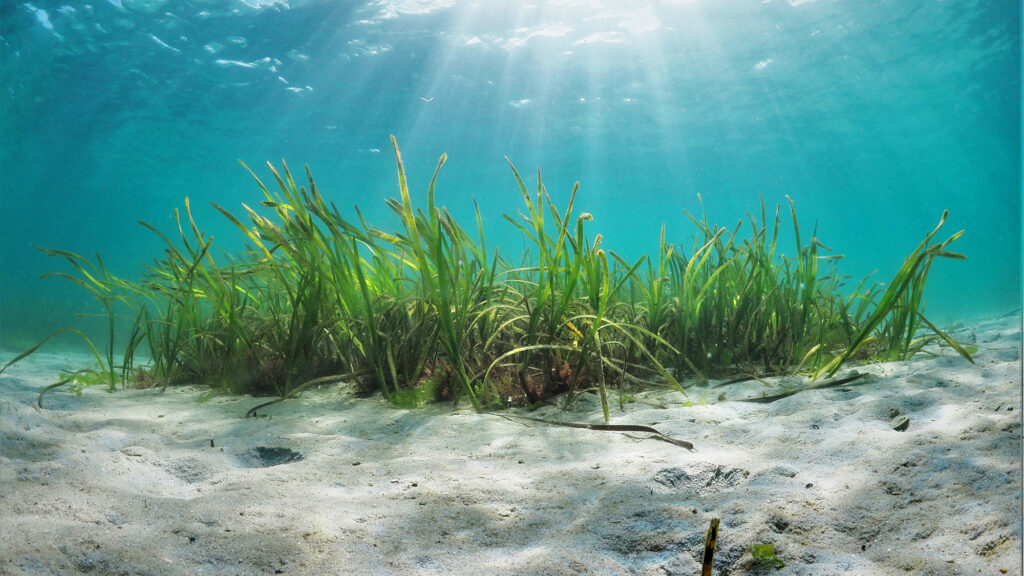This story was originally written for Kyriaki Goni’s Networks of Trust project, where it still circulates. I’ve been spending a lot of time with seagrass lately, and wanted to bump this story back into active memory, so here it is. Happy 2023.

Paradigm shifts, it was said, only happened when the old scientists died. People don’t have them, they’re too stubborn, too set in their ways. Real change is a social process, a diachronic matter of successive generations.
Maybe it’s still true, but we know now that generations do not refer merely to human generations, to the twenty-to-thirty year cycle of cohorts, but inhere at other scales too: in the minute-by-minute ticking of bacterial clocks and the centuries-long flowering of trees.
We had to shift our sense of time when the waters came, breaking first over the drowning islands of the Pacific, the Sundarbans, and the Florida keys, and then the reclaimed territories of Norfolk and the Netherlands, Tokyo bay, Singapore, Dubai, and the Pearl River Delta.
And then they came for us, welling softly over the lip of the Mediterranean basin, breasting the Pillars of Hercules, rising inexorably over the beaches and harbours, submerging jetties, break-waters and harbour walls.
Suddenly, everything shifted. Not just our space – being steep islands, we lost little territory – but the space of the world. The shape of what mattered. No harbours meant no oil; power was defined by those who got sunshine, those who got wind. We had sunshine; we had wind; and somehow we were prepared. We were even prepared for the shift in time, shocking as it was: the steady in-out of the tide and the succession of the seasons, the level of it, its reliability, replaced by ever-rising waters, storms, and droughts. Again: it was time that shifted, along with space.
We noticed it first in the movement of the seagrass. Single, communal, thousand-year-old clonal organisms, covering thousands of undersea acres, acting as one in response to the warming sea. Shrinking back, as if afraid of this new-shaped world. We had never seen the seagrass move before, not as one. It, too, shifted in time. It became visible to us, became perceptually mobile, took flight, occupied our time, became sensible to it.
And in turn we became sensible to other times, aware of how we occupied them. To cut down an old tree is to colonise its time; to breed new lichens, to cross-fertilise them with the alien fungus that clung to the data cables; this was to assist in the birth of new temporal regimes. To found new nations, and nurse them into being. We held a truth and reconciliation commission with our neighbours in deep time.
How do you see us? we asked. How do we appear to you? What have we done, in ignorance? And how might it be repaired? If not repaired, then brought into some kind of alignment, some form of mutual recognition, solidarity, and consensus.
Become cognisant of different, diverse times, came back the answer. Live in your minutes, hours, and days, but listen to the voice of years and centuries; try to perceive the tic-tic-tic of floating plankton and the flickering subatomic life of photons as they ricochet from object to object, router to router, star to retina, sunbeam to photovoltaic cell. Try to care.
And slowly, ever so slowly, yet faster than any of us, individually, could conceive, we accepted that while we could only live fully within our own allotted scale – metres and miles, hours and years, the narrow band of visible light – that which existed outside this tiny slice of infinite space-time had knowledge, agency, and life. Which we could share in.
The present constitution is thus: we share these islands with one another and the teeming choral multitude of others; sensible and insensible; animal, machine, vegetable, mineral, and irresolutely, inescapably, alien. None has its place; none is reducible to type; nothing fits neatly into any category. When we need to decide what to do, we will ask this question of everyone and every other: who sees, who hears, and who has something to contribute? And the answer comes back every time: everything.
The seas will keep on rising for some time. We cannot change the past. And when they overtop our islands we will ask the seagrass, if it’s still there, to knot itself into rafts for us, so that we may sail out and onward into this vast new ever-changing would together.
Comments are closed. Feel free to email if you have something to say, or leave a trackback from your own site.